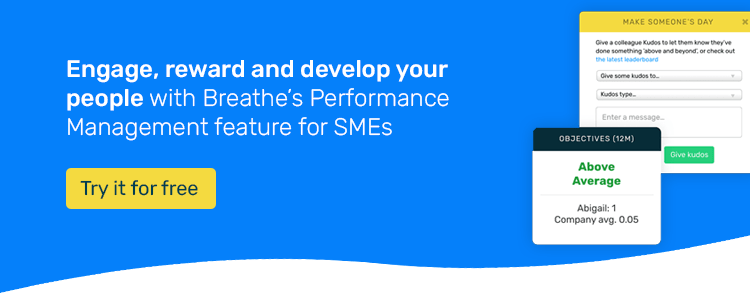An employee's performance appraisal provides a regular opportunity for line managers and employees to review the employee’s performance and set objectives for the future.
The performance appraisal is a key part of the wider framework of a performance management system which includes regular one-to-ones and and frequent reviews.
Regular feedback and appraisals will help the employee to feel engaged with your company and the tasks they're required to do.
Skip to:
What is a performance appraisal?
6 actions for before a performance appraisal
What to do after a performance appraisal
What is a performance appraisal?
A performance appraisal is a formal meeting between an employee and their line manager, reviewing performance over a set period of time (such as six months or a quarter).
The appraisal meeting needs to be structured in a way which encourages an open and honest discussion. The focus needs to be on evidence of performance, rather than personal opinions.
The discussion should lean towards positivity, placing an emphasis on the employee’s development and encouraging personal growth.
Understanding the appraisal process
The appraisal process usually involves three stages: preparation, the meeting itself, and follow-up afterwards. Here are some tips for each stage to help them run smoothly.
6 actions for before a performance appraisal
1. Make notes well in advance
Preparation for the meeting in advance can go a long way. Being able to recall notes made earlier on in the year is very helpful when commenting on overall performance throughout the year.
2. Give your team enough notice
At least two weeks is usually considered fair notice for an upcoming performance appraisal, to allow employees to prepare.
3. Provide employees with self-assessment forms
Self-assessment forms can act as a prompt to get employees thinking about their strengths, and what they could perhaps do better. Invite them to think about any barriers to their performance, their plans for future work and any training & development that could be useful .
Ideally, these forms should be used as a tool to get the employee thinking about their own development, rather than being the sole focus of the appraisal.
4. Find a suitable environment
Somewhere comfortable, private and distraction-free is the ideal space to hold an appraisal. Tea and biscuits are also very favourable.
5. Block out enough time
You don't want to rush an appraisal - give yourself and the employee time to cover everything you both want to. Ensure you're allowing at least an hour, plus time for wrapping up.
6. Plan and structure the meeting
Every appraisal will look different, but having a clear structure to the meeting will help everyone to stay on track.
During the performance appraisal
-
Encourage your employee to share
Ask questions that draw out the employee's reactions and ideas. Leading questions or questions which only require a 'yes' or 'no' response should be avoided. Let your employee lead and explain what their biggest wins or challenges have been, and go from there.
-
Make sure your employee feels at ease
Begin the meeting as you would any other meeting or one-to-one, by asking how your team member is doing. It's always a good idea to start with your employees' strong points and place emphasis on good work already done.
-
Discuss strengths and weaknesses
If there are areas of performance that need to be improved, then these need to be discussed openly. Try to let the employee lead and acknowledge their own weaknesses if possible. You might find this is an easier conversation.
-
Talk about development opportunities
Discuss ideas for training, learning & development. If both parties can put forward some suggestions for a development plan, this is a good start.
-
Don't raise any concerns not previously discussed
There should be no surprises during the appraisal. If you have had any concerns about an incident or performance during the year, this should ideally have been raised at another time (e.g. at the time of occurrence).
-
Set 'SMART' objectives
SMART goals stands for Specific, Measurable, Achievable, Relevant & Time-based.
This is important, as it will help both you and your employee to monitor progress accurately and stay focused on deadlines & expectations.
-
Good opportunity to discuss salary
The annual performance appraisal is often a good time to discuss a raise in salary or promotion opportunities, if either party should want to.
What to do after a performance appraisal
-
Summarise
Hopefully you’ve been taking notes during the meeting? Your employee needs to own the objectives and goals you’ve set together so make sure they’re clear
-
Provide written feedback
Whether on old fashioned paper or electrically, let your employee see your notes and be able to take them away.
-
Discuss any next steps
Whether this relates to learning & development or training plans, provide details of what will happen next. If there have unfortunately been any disagreements, then make sure your employee knows what the next steps are, too.
-
Book in the next appraisal meeting
Whenever you both decide this needs to be, make sure it’s in the diary.
Performance appraisal FAQs
What is a performance appraisal?
A performance appraisal is a formal meeting between a manager and an employee to review past performance and set goals for the future.
Who are performance appraisals for?
Performance appraisals are useful for all employees, no matter their role or level. They give employees the chance to talk about progress, share achievements and raise challenges. For managers, they’re a way to give feedback, recognise good work and support development.
What are 3 types of performance appraisal?
Different types of performance appraisals can include check-ins, 360 feedback or project-based reviews.
Sometimes you might encounter grading or rating appraisals, measuring other metrics to get a view of a person's work and progress in an appraisal.
What are the most commonly used types of appraisal?
The most commonly used types of appraisal are normally ranking or grading appraisals, where employees are given a number on a scale to summarise their performance.
This can sometimes look like objective management appraisals (e.g. how well you did at achieving objectives x, y and z).
Some businesses operate behaviour-based appraisals, or 360 reviews, where feedback is given and received.
What are examples of things said in performance appraisals?
Examples of things you might say in a performance appraisal could include "you're very organised in your tasks and you complete them on time, or in advance of the deadline", or "you show a strong willingness and motivation to achieve your objectives. Your efforts are noticed and appreciated - thank you for all your hard work."
If you want to improve something, you might ask the employee how they feel about a certain topic, or how they think a project went. If you have ideas about how this can be better achieved in future, you could open with "In future, I challenge you to think about... [detail your personal feedback]."
Are appraisals required by law?
Although performance appraisals aren't legally required in the UK, they are widely recognised as best practice and are a key part of performance management. Regular appraisals help identify training needs, support employee development and ensure fairness in decision-making.
What are the benefits of regular performance appraisals?
Regular appraisals help create space for open conversations, strengthen relationships and support personal development. They’re also a useful way to recognise good work, provide constructive feedback, boost employee engagement, keep goals aligned and spot any issues early.
How often should appraisals be carried out?
There’s no one-size-fits-all approach, but many SMEs hold appraisals once or twice a year, often as part of an annual review or appraisal period. These are usually supported by more regular check-ins to help keep the conversation moving forward.
Find out how Breathe's easy-to-use HR software system can help you to manage employee appraisals and other aspects of performance by trialling for free today.

Author: Aimée Brougham-Chandler
An IDM-certified Digital Copywriter (2023) & English Language & Literature graduate (BA Hons), Aimée is Breathe's Content Assistant. With 3 years' content marketing experience, Aimée has a passion for writing - and providing SME HR teams with solutions to their problems. She enjoys delving into & demystifying all things HR: from employee performance to health and wellbeing, leave to company culture & much more.






